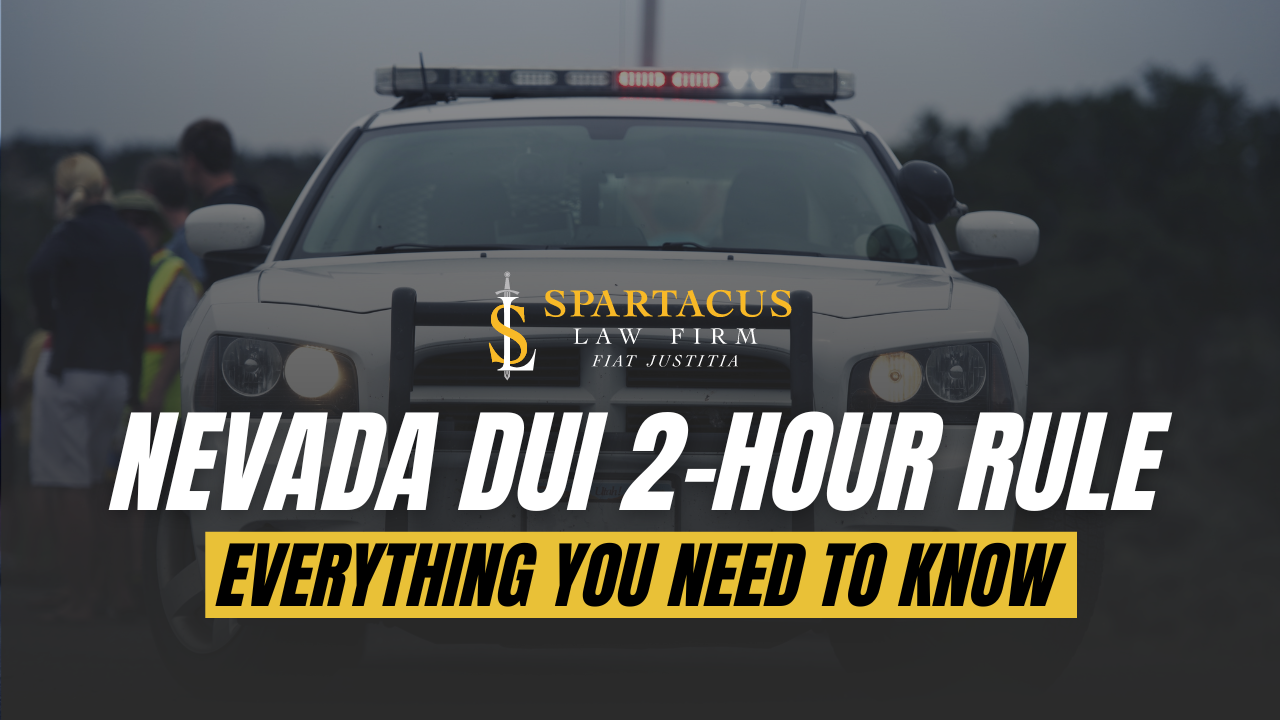Understanding the “2-Hour Rule” For DUI In Nevada
Are you familiar with Nevada’s 2-hour rule for DUIs? If a person is pulled over and suspected of driving under the influence, the officer may conduct a breathalyzer or blood test to measure their BAC. It is considered legally intoxicated if their BAC is at or above 0.08%, regardless of their level of impairment or sobriety. The offense is considered “per se,” which means it is illegal by definition and does not depend on any other factors. For instance, even if a person’s BAC level is over the legal limit but they appear sober, it is still considered illegal.
Table of Contents
ToggleIn most cases, an individual can decide between a blood test or breathalyzer test, unless the officer believes they are intoxicated due to drugs. In such a scenario, the individual will have to take a blood test. If you’re facing DUI charges in Nevada, it’s critical that you contact an experienced DUI lawyer who has experience representing these cases. Contact the Spartacus Law Firm today for a consultation and to learn more about how we can help.
Overview Of DUI Laws In Nevada
In Nevada, if you are over the age of 21, it is against the law to drive with a blood alcohol concentration (BAC) above 0.08. However, if you are an underage driver or a commercial driver, the limit is different. It is also illegal to drive under the influence of drugs or controlled substances. If you are pulled over and your BAC is above the legal limit or your blood/urine tests show that you exceed the prescribed limits, you can be arrested and charged with DUI.
One important aspect of Nevada’s DUI laws that is often overlooked is the two-hour rule. According to this rule, if your BAC was above the legal limit within two hours of driving, you may face DUI charges. This means that even if your BAC has decreased below the legal limit, you can still be held accountable for DUI. Moreover, if you reached your destination safely after driving, you can still be arrested for driving under the influence.
Why Was The Nevada DUI 2-Hour Rule Implemented?
The purpose of the Nevada DUI 2-hour rule is to stop drivers from using the dangerous “drink and dash” method. This technique involves drinking alcohol and then immediately driving home, hoping to outrun the effects of the alcohol. However, this method fails to take into account how long it takes for alcohol to be fully absorbed into the body. As a result, a driver may still be above the legal blood alcohol limit even if they feel they are able to drive safely.
The 2-hour rule allows law enforcement to test drivers for alcohol consumption accurately, regardless of when they drank. This measure ensures that impaired drivers can be detected and prevented from causing harm to themselves or others. It’s worth noting that the 2-hour rule applies to all drivers, whether they are above or below the legal alcohol limit. If a police officer pulls you over and suspects that you are driving while under the influence of alcohol, you will be required to take a breath or blood test. It doesn’t matter how long ago you consumed alcohol. Knowing this rule and its consequences can help you stay out of trouble and ensure your safety while driving.
Other Interpretations Of The Nevada DUI 2-Hour Rule
The “two-rule rule” can also refer to the time frame for testing blood alcohol content (BAC) levels. If a person is tested for BAC more than two hours after driving or being in physical control of a vehicle, the results may not be valid in court. In other words, if you were arrested for DUI and your BAC was measured more than two hours after driving, it cannot be used as evidence against you.
In order to make an arrest, police officers must follow certain protocols. If they don’t, any evidence they gather may be ruled inadmissible. For DUI arrests specifically, there are several steps that the arresting officer must take. For instance, before making an arrest, the police need to have probable cause. To establish this, they may administer a preliminary breathalyzer test or field sobriety tests.
If the police have reasonable grounds to suspect you, they will inform you of your Miranda rights. After that, they will take you to the nearest jail where they will perform a more accurate test to measure your Blood Alcohol Content (BAC). This test is usually called the evidentiary test. To be accepted as evidence in court, this test needs to be conducted within two hours of the incident. According to Nevada law, if more than two hours have passed since you last drove or were in physical control of the vehicle by the time you reach the jail, the evidence of your BAC can be dismissed in court.

Frequently Asked Questions
How Does The 2-Hour Rule Impact DUI Cases In Nevada?
The 2-hour rule is important in Nevada DUI cases. It requires evidence that the driver had a BAC over the legal limit of 0.08% either during driving or within two hours of driving. If a driver is stopped by police for driving under the influence (DUI) and their blood alcohol concentration (BAC) level is tested at the police station or hospital, the prosecution must prove that the driver’s BAC level was also over the legal limit at the time they were driving or within two hours of driving. Proving this can be difficult for the prosecution due to various factors that affect BAC levels, such as how fast alcohol is absorbed, metabolized, and eliminated from the body. It’s possible for a driver’s BAC level to be below the legal limit while driving but rise above it within two hours of driving.
It is important to remember that a driver can still face a DUI charge even if their BAC level can’t be proven above the legal limit within two hours of driving. This is because impairment by drugs or alcohol at the time of driving can also lead to a charge. To avoid legal trouble and prioritize safety on the road, it’s best to refrain from drinking and driving altogether.
How Can The DUI 2-Hour Rule In Nevada Affect Your Case?
If you are accused of driving under the influence in Nevada, the DUI 2-hour rule can have a big impact on your case. This rule means that the prosecution needs to prove your blood alcohol concentration (BAC) was over the legal limit when you were driving by giving you a chemical test within 2 hours of your arrest.
If the test is not administered within the 2-hour window, the court may not accept the results as evidence. Therefore, it may become difficult for the prosecution to prove that you were driving under the influence at the time of your arrest. Please keep in mind that there are some situations where the Nevada DUI 2-hour rule doesn’t apply, such as in cases where someone was hurt or killed in an accident. Additionally, it’s important to know that the rule only pertains to blood and breath tests, and if a urine test was given, the results can still be used to determine your BAC even if it was taken outside of the 2-hour timeframe.
It’s crucial to comprehend how the DUI 2-hour rule can impact your case in Nevada if you face charges of driving under the influence. If you think your test was conducted outside of this timeframe, seek guidance from a skilled DUI lawyer to determine the optimal defense plan.
Contact Our Nevada DUI Lawyer Today
If you or someone you know has been arrested for driving under the influence, it’s crucial to get in touch with a DUI defense attorney promptly. At the Spartacus Law Firm, our criminal defense lawyer specializes in DUI cases and can assist in constructing your defense. Our legal team will work tirelessly to safeguard your rights and obtain the best potential outcome. We possess the required expertise and resources to protect your rights and ensure that you receive the optimal outcome, regardless of whether this is your first DUI offense or you have a complicated situation. Don’t delay, contact us immediately for a consultation and to learn more about how we can help.






